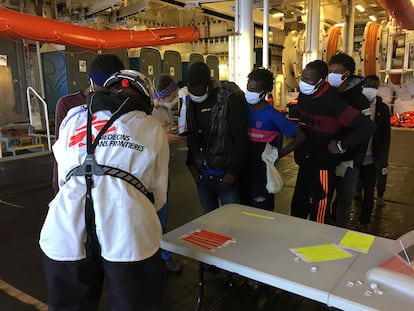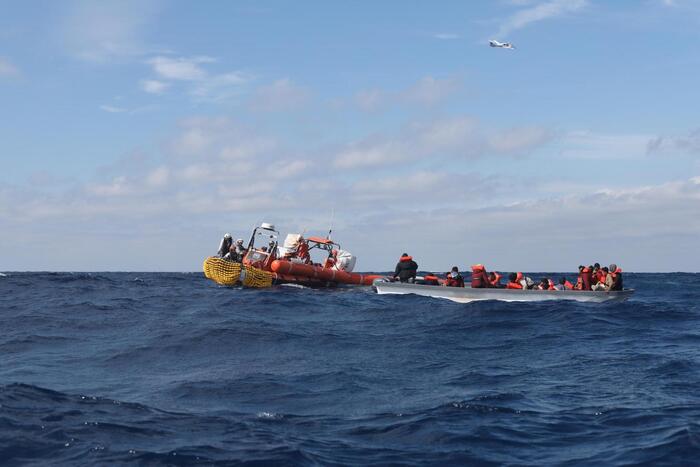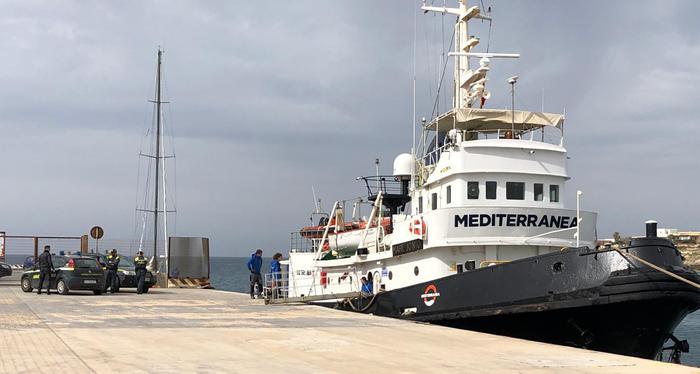With hugs, dances and some tears, the 26 young people saved by Doctors Without Borders (MSF) when they were adrift in the central Mediterranean, in a small blue wooden boat with a broken engine, celebrated their rescue.
After 10 hours sailing, they have received with relief the message from the mission's human rights officer: “We are here to save you.
Everything is going to be fine ”.
It has been an operation against the clock in the presence of the Libyan Coast Guard, which has gone to the place when it has detected the maneuver and has threatened by radio the
Geo Barents
, the ship of the humanitarian organization that has been patrolling the area for 10 days. salvage and rescue off the coast of Libya.
More information
On board the 'Geo Barents': the migration crisis from a rescue ship
A path of violence and sexual abuse until getting on a boat
The boat was found this Thursday 44 nautical miles off Sabratah, after a busy morning on the command bridge in which several notices from the NGO
Alarm Phone
of possible boats in danger and information from the NGO
Pilotes Volontaires
de three interceptions by the Libyan Coast Guard, near the position of the
Geo Barents
.
Among those rescued, from Mali, Ivory Coast, Guinea-Conakry, Senegal, Sudan and the Gambia, there are 15 unaccompanied minors.
In the first conversations they have had with the crew, they have said that they left at four in the morning (local time) and that they had not called anyone during the crossing because they feared being intercepted.
In fact, seeing the ship from afar, they tried to avoid it because they feared it was Libyan, but one of the boys recognized the MSF logo for the organization's work in Mali and they turned around.
Julie Melichar, head of human rights for MSF's 'Geo Barents' mission, during the rescue.
Everything went very fast. As the MSF ship was about to change course slightly, a team member thought he saw something to starboard, and using the binoculars came confirmation: a small wooden boat full of people. Shortly after, Antonin Richard, leader of one of the rescue speedboats, gave the radio warning to the rest of the crew: "All MSF team ready for rescue." The team of lifeguards rush to the changing room to change: waterproof pants, life jacket, helmet, goggles and gloves. Waiting for the green light, they meet on the landing of access to the sides of the ship from where the two speedboats are lowered. After 10 days at sea in which they have trained hard, there is a hug and they wish each other "luck" before starting the operation.
At the same time, on the command bridge, the head of the rescue team, Anabel Montes, and the head of the mission, Barbara Deck, have a tense conversation with the Libyan Coast Guard, which asks for information about the ship and threatens MSF. This situation creates tension among rescuers. The head of human rights, Julie Melichar, on the bow of one of the speedboats, makes the first contact to reassure the migrants. “We are Doctors Without Borders, a humanitarian organization, we are here to help you. Everything is going to be fine ”, he says before starting the delivery of the life jackets to pass them, one by one, to the boats and take them to the ship. Also ask if there are children or a pregnant woman to notify the medical team if necessary. Not this time. The migrants, expectantly, follow orders,and once in the boats, some make the symbol of victory.
Registration of the migrants rescued by the MSF team in the 'Geo Barents' mission.
"Welcome".
“Welcome aboard”, greets you Philippe Juliani, Head of Logistics at
Geo Barents
, while helping them remove their lifejackets. Almost all of the rescued speak French, so you can exchange a few words with them. "How's it going?" "All good?". The medical team awaits them on the deck where they will be staying, to take their temperature and give them a mask. Based on the first assessment, they all appear stable with no potential signs of covid-19. Some give off a strong fuel odor, possibly from engine leaks. In line they thank, celebrate, high-fives. One of them kneels down and cries. “Everything is going to be fine. You are safe now, ”repeats the crew. Although the boat was full, they were not wet, they were barefoot, but soon they received a change of clothes. Before, they are registered with their age and country of origin. Everyone receives a red bracelet with a number, and in addition,a yellow one if they are minors or a yellow one with a black stripe if they are unaccompanied minors.
First belongings
Once registered, the rescued receive a blue bag with clothes and food, which contains a white t-shirt, gray cotton pants, a hat, socks, a blanket, energy food, a cup, water, juice and a small toiletry bag.
After a while, they continue to clap their hands and open the food.
Some people take out their mobile and take a picture.
The migrants rescued by the 'Geo Barents', with the clothes that MSF has provided them.
The head of the mission, Barbara Deck, delivers a welcoming speech, which is translated into French by Julie Melichar and into Arabic by Salah Dasuki, the cultural mediator.
It is a first contact in which they reiterate that they are safe, offer them medical and psychological care.
The speech ends with applause and it is time to leave them alone for an hour so that they can assimilate everything that has happened to them in the course of a day.
During the night the surveillance rounds will begin to make sure that everyone is well and that if they need something, they always have a reference person to contact.
Starting the next day, they will also have a schedule to get up, shower, get some exercise, and eat.
Antonin Richard (left), leader of one of the speedboats, minutes before the rescue.
Ten days without bailouts
Once the mission concluded, Antonin Richard was happy to have been able to carry out the rescue and that the
Geo Barents
had fulfilled
with your mission.
"This is a search and rescue boat, we have been searching for 10 days, which is a lot, and I am happy to have been able to save these people."
However, he acknowledges that it is a bittersweet sensation.
"It means that people are leaving Libya putting their lives at risk, but it is also good to be able to help people not drown in the Mediterranean and take them to a place where they can be safe."
MSF has reported the rescue to the Libyan authorities, who have not responded, and has proceeded to do the same with those in Italy and Malta pending instructions to go to safe harbor.
So far tonight the 26 migrants have taken it to safety aboard the
Geo Barents
.
More than 300 people intercepted by the Libyan Coast Guard in one hour
The pilots of the NGO 'Pilotes Volontaries' witnessed three interceptions in just over an hour. “It was very sad, the Frontex drone was in the area and the Libyan Coast Guard made the three interceptions in a row. We know what [the migrants] are going to experience when they return to Libya, ”lamented José Benavente, a member of the NGO that provides air support to rescue NGOs in the Mediterranean with the 'Colibí 2' plane. In a telephone conversation with EL PAÍS, shortly after landing in Malta at the end of his flight hours, he explained that they first saw an empty boat at around 09.46, shortly after 11.00 they detected a column of smoke and when they approached they saw that it was another boat that was burning.It is common for the coast guard or rescue boats operating in the area to burn the boats once the crew has been transferred so that in case it is sighted by another boat they know that they were rescued and do not initiate a search for survivors. Finally, at 11:07 the third took place. The NGO estimates that a hundred people would travel on board the first two in each one and about 120 in the third. From the air they were able to take pictures of the crowded Libyan Coast Guard boat, something Benavente considered "dangerous."The NGO estimates that a hundred people would travel on board the first two in each one and about 120 in the third. From the air they were able to take pictures of the crowded Libyan Coast Guard boat, something Benavente considered "dangerous."The NGO estimates that a hundred people would travel on board the first two in each one and about 120 in the third. From the air they were able to take pictures of the crowded Libyan Coast Guard boat, something Benavente considered "dangerous."












